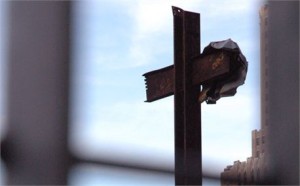 NEW YORK – A federal appeals court last week pressured an atheist group to better explain why what has become known as the ‘Ground Zero Cross’ should be kept out of the National September 11 Memorial Museum and why the artifact, which was removed from the rubble of the 2001 attack on the World Trade Center, is “offensive”.
NEW YORK – A federal appeals court last week pressured an atheist group to better explain why what has become known as the ‘Ground Zero Cross’ should be kept out of the National September 11 Memorial Museum and why the artifact, which was removed from the rubble of the 2001 attack on the World Trade Center, is “offensive”.
As previously reported, the group American Atheists filed a lawsuit against the presence of the cross in 2011, asserting that it has caused individuals to suffer “depression, headaches, anxiety, and mental pain and anguish,” and even indigestion. It had filed suit against numerous responsible parties, including the Port Authority of New York and New Jersey, the World Trade Center Memorial Foundation and New York City Mayor Michael Bloomberg.
In March of last year, U.S. District Court Judge Deborah Batts, appointed by Bill Clinton, rejected the arguments of American Atheists regarding its belief that “the government enshrinement of the cross” excluded non-Christians from being recognized in the tragedy. She dismissed the group’s lawsuit, stating that the cross served both a “historic and secular purpose.”
“No reasonable observer would view the artifact as endorsing Christianity,” Batts wrote. “[The museum curators] have not advanced religion impermissibly, and the cross does not create excessive entanglement between the state and religion.”
The plaintiffs appealed Batts decision, which is now before the appeals court.
Last week, the appeals court cited an amicus brief filed by the Becket Fund for Religious Liberty, a nonprofit law firm that specializes in church-state law.
“We’re thrilled that the court picked up on this issue,” said group lawyer Eric Baxter. “Courts should not allow people to sue just because they claim to get ‘dyspepsia’ over a historical artifact displayed in a museum.”
“Taking personal offense is not an injury that warrants invoking the power of the courts to shut down everything you disagree with,” Baxter also stated. “The Constitution is not a personal tool for censoring everyone’s beliefs but your own.”
Baxter’s brief also argued that the American Atheists did not have grounds to bring the suit in the first place.
The plaintiffs now have until July 14 to file supplemental legal briefs to respond to the questions of how the offensiveness of the cross becomes a “constitutional injury” and how displaying the cross “marginalizes them as American citizens,” and the court also directed the plaintiffs to substantiate their claim of how the museum and Sept. 11 memorial are receiving taxpayer money.
Become a Christian News Network Supporter...


